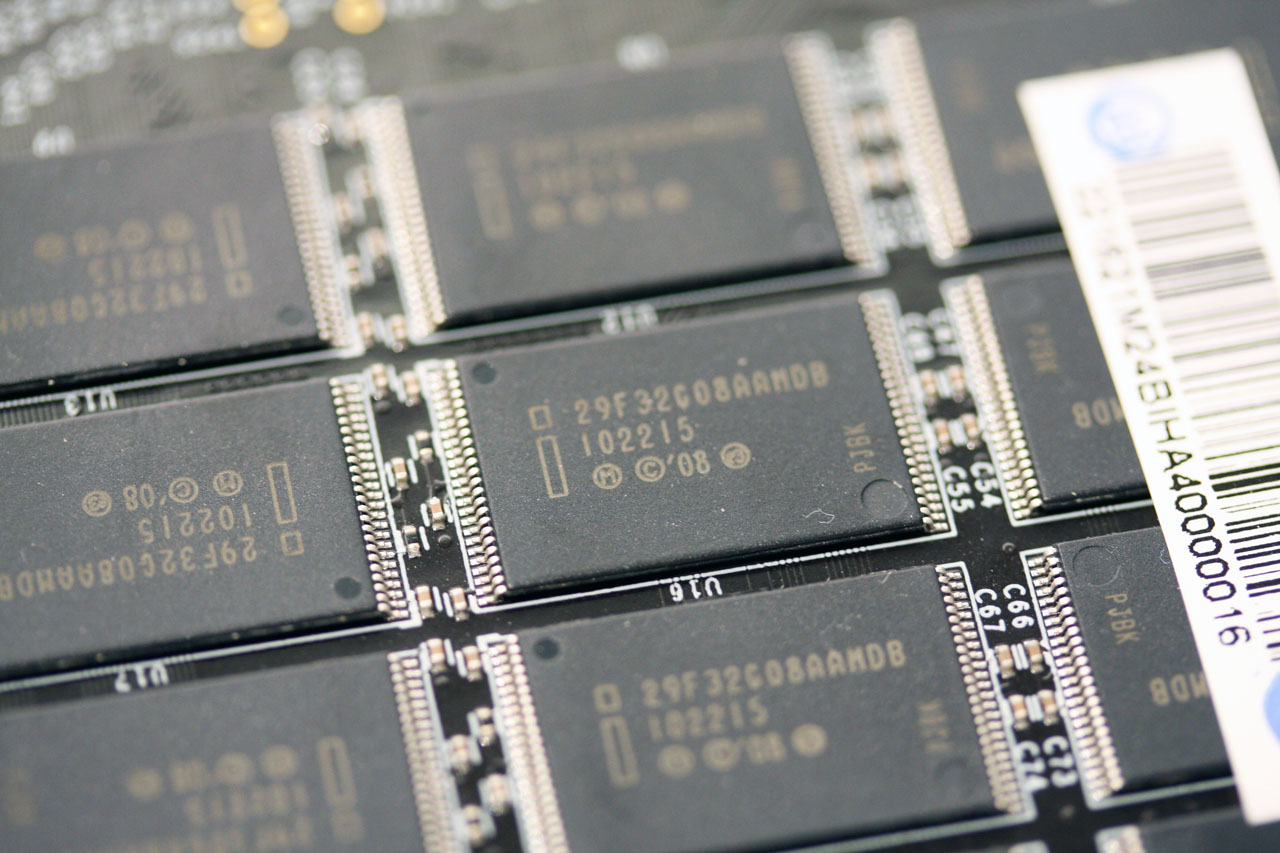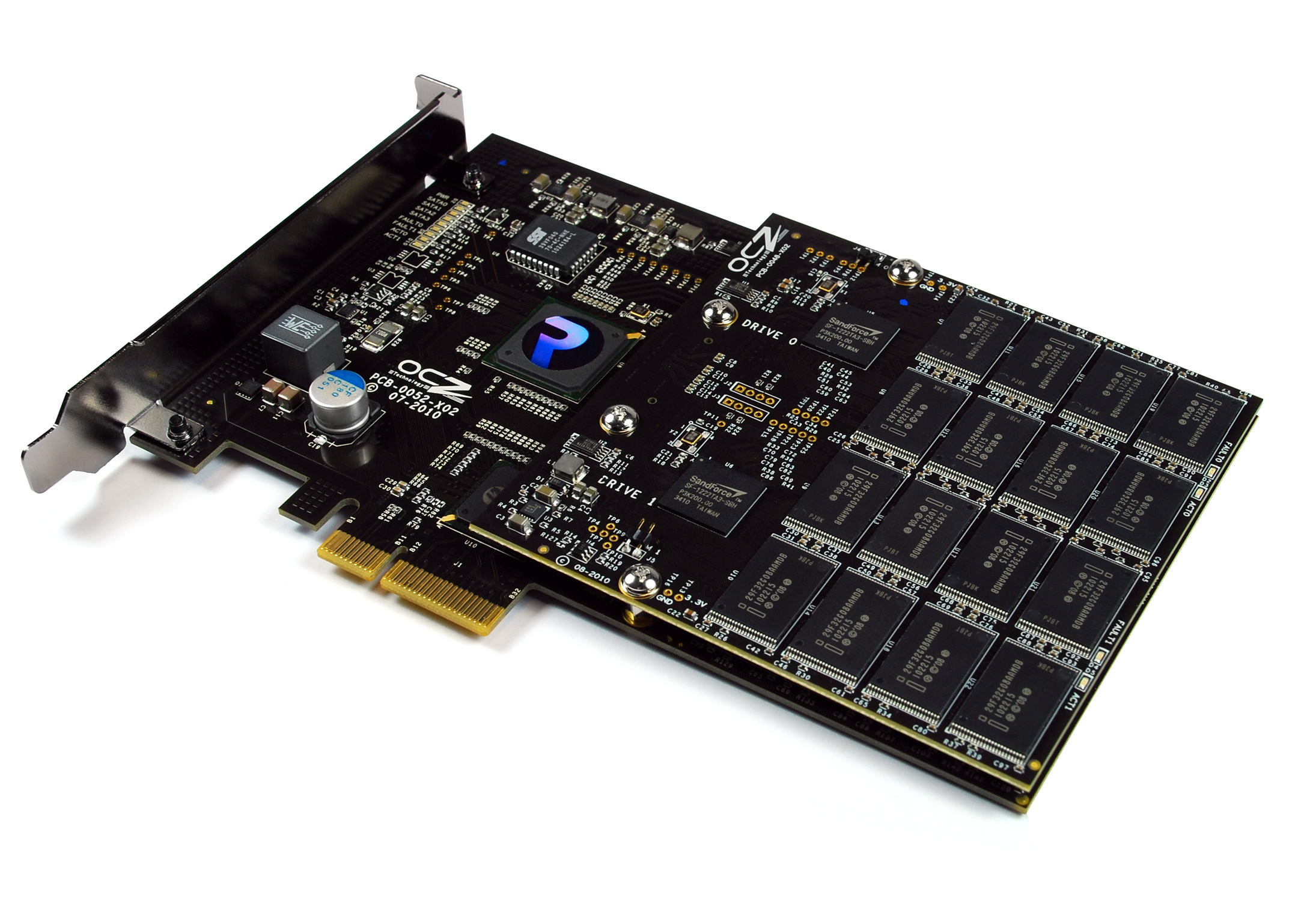OCZ’s RevoDrive X2: When A Fast PCIe SSD Isn’t Fast Enough
In a storage market where it's easiest to take one vendor's controller, another vendor's NAND flash, and put the two in a standard 2.5" SATA drive, OCZ continues innovating, giving IT professionals and power users more performance with its RevoDrive X2.
Get Tom's Hardware's best news and in-depth reviews, straight to your inbox.
You are now subscribed
Your newsletter sign-up was successful
Meet OCZ's RevoDrive X2
Update, 2/9/2011: After going back and forth with Tom's Hardware reader syrob (who owns an Asus Sabertooth X58) and representatives at OCZ, it looks like there are some compatibility issues that affect RevoDrive and IBIS SSDs.
Specifically, the problem crops up on motherboards poorly optimized for OCZ's large firmware. If you try to boot up from a RevoDrive X2, for example, with Intel's ICH10R set to RAID mode (also requesting memory space), platforms unoptimized for proper ROM loading run out of space (limited to 128 KB), failing to load whichever device requests space last. If you're booting from the RevoDrive, Intel's option ROM will probably be the one to suffer.
Why is this issue notable, despite its seemingly-limited application? If you're using a 120 GB or 240 GB SSD, purchased for five or six hundred dollars, there's a good chance that you're leaning hard on mechanical storage for personal files and less performance-sensitive applications. A couple of 1 TB or 2 TB disks in RAID 1 are a great way to protect pictures, movies, and documents without wasting space on the SSD. OCZ's drives and RAID configurations go hand-in-hand here.
Solving this issue requires one of two things to happen. Either OCZ has to work with Silicon Image to minimize the ROM footprint of its drives, leaving more room for other devices within that 128 KB limit, or motherboard vendors have to put more effort into optimizing their BIOSes for option ROM space utilization. Unfortunately, it sounds like OCZ is having trouble shrinking its BIOS footprint, and many enthusiasts are finding it hard to get the motherboard vendors to take the initiative on improving compatibility with a niche product. As a result, OCZ recently published a motherboard compatibility guide with test notes corresponding to a wide range of platforms. The list is by no means comprehensive, but it does make clear that certain boards simply will not support the RevoDrive/IBIS and integrated RAID functionality at the same time. EVGA's offerings seem particularly problematic in this regard.
The impetus is clearly on OCZ here to get its firmware into a more flexible footprint. I'd like to think that motherboard vendors could be goaded into optimizing their desktop boards for high-end add-in cards, but I simply don't see that happening. And at the end of the day, it's OCZ charging almost $700 for a 240 GB PCIe-based SSD.
Introduction
A couple of months back, we previewed OCZ’s high-speed data link technology—a PCI Express-based interconnect designed to overcome the limitations of SATA. The idea there was that, despite a recent move to 6 Gb/s, Serial ATA simply could not evolve fast enough to accommodate solid state drives. SSDs are already banging up against the practical limitations of SATA 3Gb/s, and if we’re to believe representatives of SandForce, the next-gen SF-2500/2600 controllers will push up to 500 MB/s each.
Get Tom's Hardware's best news and in-depth reviews, straight to your inbox.
When SATA 3 Gb/s first emerged, storage hadn’t evolved to the point of making an upgrade from SATA 1.5Gb/s worthwhile. And if we were still stuck with mechanical hard drives, shifting to SATA 6Gb/s wouldn’t make any sense at all. But SSDs represent one of those hardcore, line-in-the-sand inflection points that change everything. Now we find ourselves facing the interface’s obsolescence before it even really starts taking off.
Alright, so nobody is going to be handicapped by SATA 6Gb/s on the desktop any time soon. But OCZ was able to demonstrate the insufficiency of today’s fastest storage interface by throwing four SandForce controllers onto a pair of stacked PCBs, cramming the silicon sandwich into a 3.5” form factor and attaching it to a very PCI Express-like bus. The result was streaming read and streaming write performance well in excess of the theoretical 600 MB/s third-generation SATA purportedly enables.
Here’s the thing, though: the 240 GB OCZ IBIS drive we previewed currently sells for $659 bucks. That’s less than the $739 we were told to expect. But it’s far too pricey for all but the richest enthusiasts. To be fair, that’s not really the market OCZ is gunning for with IBIS, anyway. The company explicitly calls out enterprise environments as the best fit—customers able to exploit the drive’s massive IOPS throughput.
Another Way To Do High-Performance SSD
So let’s back up a moment. Ninety-nine times out of 100, IBIS is going to be overkill for you (it’s a good tech demo; at $2.75/GB, it’s unrealistic though). But OCZ also sells bootable SSDs that drop straight into PCI Express slots, and it has for a while now. Are those any more palpable for enthusiasts?
OCZ recently unveiled its first attempt at bringing PCIe-based solid state technology to the desktop with its RevoDrive. Sporting transfer rates well in excess of what any single SATA 3Gb/s drive could do, it offers the performance of hardware-based RAID 0 with the convenience of a single device. But it’s not any better of a value than two SandForce-based Vertex 2 SSDs in RAID 0. In either case, you’re looking at $500 for 240 GB of capacity.
The company’s new RevoDrive X2 steps thing up a notch, forsaking value altogether in the name of performance. Priced just north of $650 for 240 GB, you’re looking at a $100 premium over a quartet of 60 GB Vertex 2s. Does the price tag even matter once you’re in such a high-end niche of the storage market? A long look at performance will help answer that question.
-
eklipz330 although i think sandforce's new controller won't be as fast as they claim, i really think it's gonna change the face of the ssd race by the end of the yearReply
and probably a new iteration of the revodrive as well... can't wait!! =D =D i need me a 160gb for less than $1/gb... that's how much i bought my raptor for like 4 years ago!! -
cmi86 Yeah its really cool and i wish i had 1...or 2 lol but it just costs waay too much money, isnt really practical for enthusiast use until the prices dropReply -
dirtmountain You routinely use $500 graphic cards (GTX580) and $1,200 displays (2560x1600)in reviews. The price for this upgrade ($650)isn't any harder to stomach then those.Reply -
cangelini dirtmountainYou routinely use $500 graphic cards (GTX580) and $1,200 displays (2560x1600)in reviews. The price for this upgrade ($650)isn't any harder to stomach then those.Reply
Aye, but it's a little less tangible than exotic graphics configurations, too. -
alidan i realy wish they would put a 7200 10000 and 15000 drive in there, all top of their respective class, just so we can get some prospective of how much an improvement these are over traditional hdds.Reply


